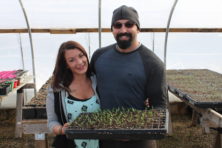Animal Farm
- Share
- Tweet
- Pin
- Share
When I taught freshmen English at Gibraltar High School, my students read George Orwell’s classic Animal Farm. Perhaps some of the adults reading this piece now were once my students and remember the novel. I suspect Pulse writer Myles does.
The story is a fable in which animals rebel against Farmer Jones (no relation!) and form a utopian society. The narrative is also an allegory, as many of the animals and plot turns represent people and events in the Russian Revolution. Finally, the work is satire, cautionary dark humor dealing with freedom, exploitation, and manipulation of language.
After the revolution and the expulsion of Farmer Jones from Manor Farm, two pigs emerge as leaders, Snowball and Napoleon. Snowball’s agenda centers on domestic items that will improve the lives of animals on the farm; Napoleon’s concerns deal with foreign affairs, especially defense.
Life on Animal Farm, as it is renamed, begins as a model of a democratic society with regular meetings of the animals to express concerns and make plans. In some respects, these assemblies were like the town hall meetings elected officials today hold with their constituents.
Although Napoleon was less charismatic and articulate than his rival Snowball, he ultimately prevailed.
The animals had created a list of seven commandments of Animalism, ideals by which they all should live. Because the list was difficult for some of the less intellectual animals to remember, it was abridged for them: “Four legs good, two legs bad!”
The sheep loved this abbreviated maxim and would bleat it for hours on end as they lay in the pasture, never tiring of it.
Snowball’s speeches were technical and nuanced, difficult for the sheep and some other animals to understand. Following Napoleon’s directives, the sheep would interrupt the meetings with spontaneous bleatings of “Four legs good, two legs bad!” whenever Snowball spoke, interrupting all discourse.
By the novel’s end the democratic ideal of the Seventh Commandment, “All animals are equal,” was changed to justify the current status of animals on the farm: “All animals are equal. But some animals are more equal than others.”
Every teacher hopes that lessons learned in the classroom will not be forgotten once students walk out the door. This teacher hopes in particular that his students, now adults, when they hear of town hall meetings being disrupted by participants drowning out the voices of speakers by shouting “No more! No more! No more!” or “Just say no! Just say no! Just say no!” will remember reading Animal Farm back when they were freshmen at Gibraltar High School.
Snowball was driven off the farm; Napoleon moved into Farmer Jones’ house and along with his pig cronies enjoyed a life much as Jones and his family had. The other animals, well, they lived much as they had before the revolution.


